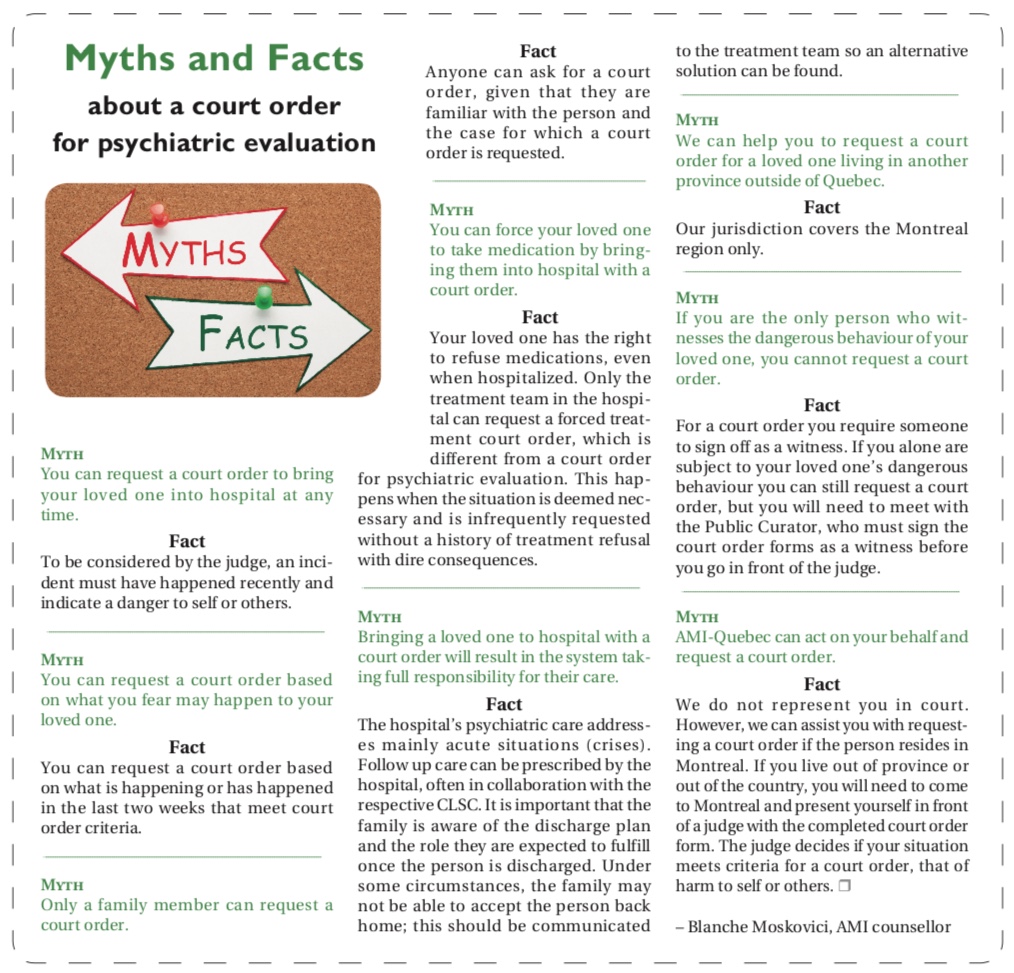Court Orders for Psychiatric Evaluation
What can you do when your ill loved one needs psychiatric help but refuses? At AMI, we can help you explore options. A last resort is a court order for psychiatric evaluation.
A court order is a legal procedure that may be required when someone poses a risk to themselves and/or to others, but refuses help. Upon request by an interested party (family or other), the court can grant a time-limited order for a psychiatric assessment.
There are 3 types of court orders that may be of interest to family caregivers struggling to help a loved one suffering from mental illness:
- Court order for psychiatric evaluation (requested by the family or another interested party).
- Court order to keep the person in the hospital (requested by the hospital, limited for up to 21 days, and can be renewed).
- Court order to force treatment(requested by the treatment team; judge decides the length of time a patient must submit to forced treatment).
The following refers to the first type of court order for a psychiatric evaluation. Information about the other two can be found here.
Involuntary Admission (court order)
This section is taken from our website: amiquebec.org/healthcare
It is always better to encourage the ill person to go to the hospital voluntarily. However, a person may not understand he needs help and it is not always possible to convince him. If he is already being followed by a psychiatrist or other mental health professionals, you may ask for assistance in trying to convince him to enter the hospital voluntarily. If he still refuses, those close to the person and aware of the situation (family, friend, practitioner) can consider whether to ask the court an order for an involuntary psychiatric assessment.
Involuntary admissions are guided by the Mental Patients Protection Act (Loi P-38.001). This Quebec law restricts involuntary confinement in an institution to cases where a person presents a danger to themselves and/or to others.
In case of immediate danger, call 911 and state there is a psychiatric emergency. Upon arrival, the police will assess the situation. If they judge that the person requires an urgent psychiatric assessment in the hospital, they will call Urgences Santé for transportation to the hospital.
If the police decide that there is no immediate crisis requiring hospitalization, but you still think your relative poses a danger to himself and/or others, you can fill out a court order request for involuntary psychiatric assessment. The request must be completed by an applicant and a witness who can testify to the person’s acute, dangerous situation. Note that such a court order is not designed to treat anyone against their will but rather to have them assessed in the hospital.
Court order forms can be obtained at your local CLSC or family association, where assistance in filling it out may also be provided. Court orders can be requested at the Palais de Justice every day during office hours. A same-day appointment can be made if you call in the morning.
After the court decision
If a court order has been granted, the requesting party must bring the signed form as soon as possible to the police station nearest the ill person’s residence. The police will call an ambulance to escort the individual to the designated hospital. If the individual has fled or cannot be found, the police will open a file. The court order will remain valid until the individual is located.
Once in hospital, the person must be examined by two psychiatrists within a period of 24 hours. Upon evaluation, the psychiatrists will decide whether the person meets the criterion of grave and immediate danger and will either release or retain him for further observation. If they decide to keep him, a second court order requesting to keep the person in the hospital must be completed within 96 hours. If granted by the court, the confinement is limited to up to 21 days. That court order may be lifted at any time during this period if the individual no longer presents a danger. While this court order gives the hospital the right to retain the patient, it does not give the right to administer treat- ment without the person’s consent.
Pros:
A court order is a last resort option when someone presents a danger to themselves (e.g., suicide attempt or ideation) or a danger to others (e.g., homicidal). It is used with discretion to ensure the safety and well-being of your loved one in the present moment by providing care and preventing escalation.
If your loved one is experiencing a mental health crisis for the first time, getting them stabilized as soon as possible is best for their well-being and recovery.
Cons:
If you bring your loved one into hospital with a court order, your loved one may feel betrayed, despite your best intentions. If the person can present themselves well, they may be able to talk their way into being discharged soon after they are brought to the hospital. The family then will need to deal with the potential backlash of anger from their loved one.
Note: Families often view a court order as a solution for difficult situations. This is seldom the case! While a court order is necessary at times, it is preferable to address any challenges amicably, without the need to resort to the court. Once a court order is ‘exhausted’ (the person is released), it is often back to square one, where the family needs to deal with the same problems, plus the possible resentment of their loved one.
– Blanche Moskovici, AMI counsellor
From Share & Care Spring 2022
Sign up for our emails to stay in touch
Please also follow us on:

